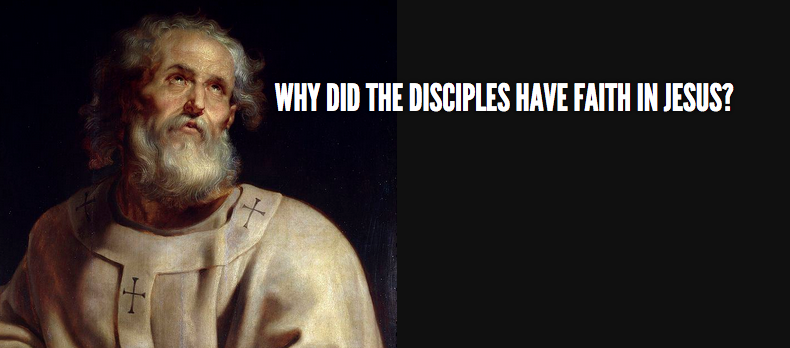Faith comes at the conclusion of a reasoning process—not as the presupposition to it. Let’s look at the disciples for a demonstration.
The disciples saw Jesus heal the sick and bring the dead to life. They saw him walk on water and calm a storm. These facts convinced them to have faith in Jesus, believing him to be the Son of God (Matt 16:16). But only at the day of Pentecost did they fully believe in Jesus as Lord (Acts 11:17). Then they received the Holy Spirit.
How did the disciples expect others to come to faith? Peter spoke to the crowd:
Acts 2:22: “Men of Israel, hear these words: Jesus of Nazareth, a man attested to you by God with mighty works and wonders and signs that God did through him in your midst, as you yourselves know…”
Peter told the people to trust in Jesus on the basis of the facts they knew. Likewise, John points to facts. John counts his report as good evidence:
John 20:30-31: “Now Jesus did many other signs in the presence of the disciples, which are not written in this book; but these are written so that you may believe that Jesus is the Christ, the Son of God, and that by believing you may have life in his name.”
Conclusions: faith comes when the Holy Spirit cuts a person to the heart, convicting him of his sin and Christ’s lordship (Acts 2:37). A person must understand his sin and Christ’s lordship before faith is possible.
“Sin” and “lordship” are concepts, and they are not innate. They come from our reasoning about observed data. As Aristotle and Aquinas held, “Nothing is in the intellect that was not first in the senses.”
What then of Augustine’s idea of “faith seeking understanding”? That phrase does accurately describe someone who already has faith. I trust in God, but seek to understand him more. But at any level what is faith?
Faith is first of all a response to facts, and facts must be grasped by reason.
We must value life, reason, and faith — in that order.
The man who values his own life will know that he has need of reason.
The man who, by God’s grace and the work of the Holy Spirit, follows reason where it leads, soon discovers his need for God. It is then that the hearing of the word of God can yield faith.
In light of the above, the modern method of presuppositional apologetics has major problems.
You may also like: Understanding and then Faith.
